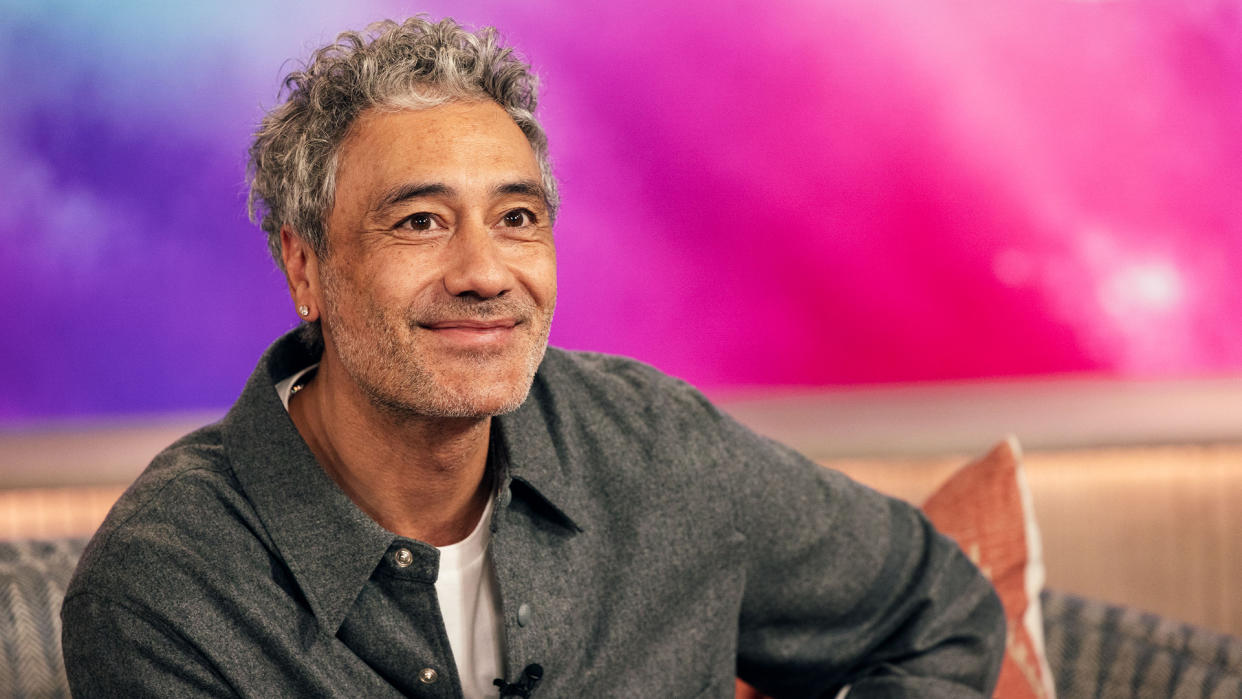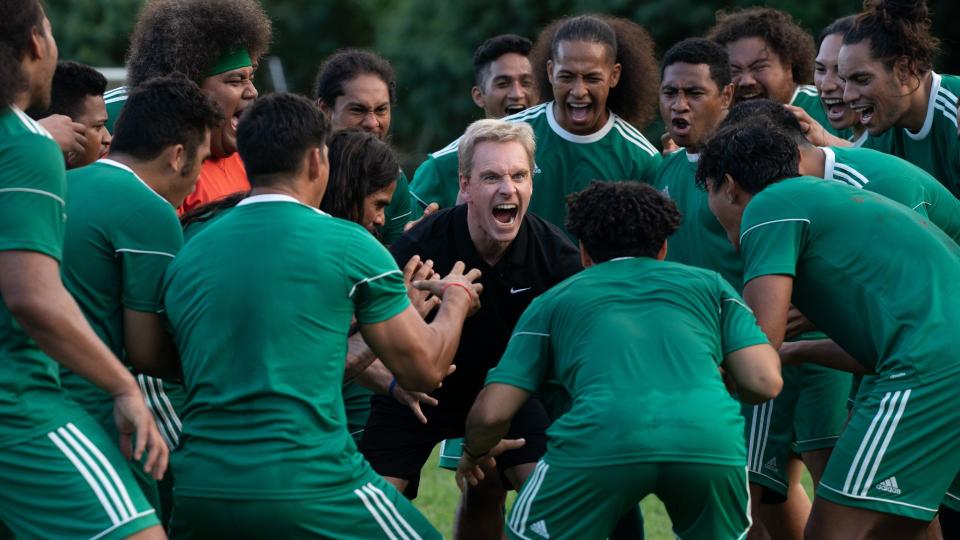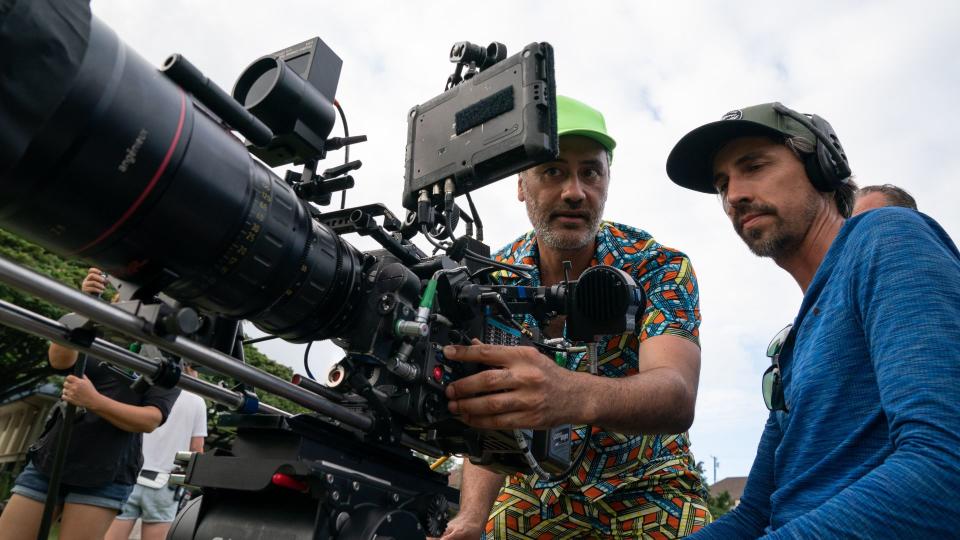Taika Waititi talks uplifting sports drama Next Goal Wins: "I do still feel like an outsider"

- Oops!Something went wrong.Please try again later.
- Oops!Something went wrong.Please try again later.
Ever since making his feature directorial debut Eagle vs Shark in 2007, filmmaker Taika Waititi has been telling wonderful stories about outsiders, whether that be a group of misfit vampire housemates (What We Do In The Shadows) or a lost god desperately trying to find his way (Thor: Ragnarok).
His latest film Next Goal Wins is no different, bringing the real life tale of coach Thomas Rongen's (Michael Fassbender) efforts to lead the American Samoa national football team to qualification in the 2014 FIFA World Cup. Widely regarded at the time as one of the worst squads in history, the side were still haunted by their 31-0 loss against Australia in 2001 – an astonishing defeat which set a new world record. Rongen was therefore set with a singular goal – American Samoa had to score one, just one, goal.
Whilst on the surface it may sound like a familiar underdog tale, given that this is helmed by Waititi you should know to expect the unexpected. The director, alongside trans rights trailblazer Jaiyah Saelua who was a footballer on that team, spoke to us about why this sports story is different, the importance of portraying difficult realities, and how it helped them embrace happiness. Our conversation below has been edited for length and clarity.

GamesRadar+: Audiences can't resist a sports underdog story, but we have seen so many before on the screen. Why is this one different?
Taika Waititi: A few things for me made this different, such as the Pacific Islander culture we are showcasing and the fact that with Jaiyah's [Saelua] character, we have a fa'afafine [which is a third gender present in Polynesian society]. Over there identifying in a different way is accepted and has always been accepted. It's like, 'get over it and let's move on with more important things', which is something I think that the world can learn from. Also, all humans – probably even some billionaires – feel like losers, that we need to do better than we are currently doing, so we are all underdogs in a way, which is why we identify with people who are on the back foot in films like this. Like Karate Kid, that's one of the greatest as he couldn't catch a break the entire movie but he just fought back. It lifts you up!
So Jaiyah, when you were approached about the project did you have any hesitations going in?
Jaiyah Saelua: I was initially excited but when I realized it would be a Hollywood feature film, I got nervous and scared, but especially because I realized that it would amplify our story in a way that would come back to me, and the responsibility would be explaining the fa'afafine identity to those who don't know anything about it, which I am happy to do. But I wasn't nervous about anything regarding the trans character because Taika is a Pacific Islander and we were comfortable knowing that he would do the right thing in our portrayal.
I love that in this film, gender is what it is. There's no huge, emotional scene talking about it – it's just there.
Waititi: I mean there are two ways of looking at this. If you keep talking about it, it doesn't normalize it, it keeps it as a talking point. Like, I saw this great thing the other day where someone was saying they are going to use the term 'male DJ', to see how it makes people feel qualifying things like that. It's weird! So, the fact that it's normalized, it's part of the culture, it's no big deal, so we don't need to talk about it, that's a great thing. That doesn't take away from the fact that it's special, as it is already special. In the West though that conversation needs to happen, as no one talks about it or recognizes it or accepts it. People there have been shying away from it, pretending it hasn't existed.

And I understand Jaiyah that you were the only person who met the actor portraying them? How was that experience?
Saelua: Me and Kaimana [the actor] were both nervous to meet each other. I understood early on that she would be portraying me in the way that Taika wanted her to, but I also wanted her to know that she needs to showcase a part of herself too. I think she did a great job in her portrayal of the trans identity and the fa'afafine existence.
She was great! What was your relationship with coach Rongen like in real life?
Saelua: It wasn't like this! He was the coach and I was one of the players, that's pretty much it.
Waititi: Boring...
Saelua: Haha exactly, that's why we needed to make it more interesting! It wasn't until much later, with the 2014 documentary, that we grew closer. So, the film is more true to our relationship now.
The story is embellished, as noted in the film's intro, but how do you balance honoring the true tale and bringing in the fictional aspects?
Waititi: There are some things you have to get right, such as being true to Jaiyah's experience and emotional moments from Thomas's life, that was all important to me. But the rest of it is mostly fair game. For example, details of how they win that final game didn't really matter as it's a fantasy tale, a retelling of what happened, which is why Jaiyah's character scores two goals... the documentary is clearly fake!
Saelua: Haha yes, thank you for that!

They do say to print the legend... This is another story about outsiders and misfits from you Taika, which runs throughout your filmography. But do you still feel like an outsider in the industry, even though you have now done huge projects with bigwigs like Marvel, Star Wars, etc.?
Waititi: I do still feel like an outsider. I came into filmmaking quite late, it never really felt like it was my dream, so I already felt like an outsider in that respect. Is this really what I want to do? I like telling stories but the medium can change for me in doing that. I feel that I'm very accepted, a lot of people support me, but even then... yeah.
And here, I wanted the theme to be happy, make a positive film, which feels like a very rare thing because most cinema is about how horrible people are to each other. It's nice to show that humans can be pretty wonderful.
Yeah, it's cinema as escapism...
Waititi: It's amazing that a film where people are happy is escapism. It's really, really sad.
It is an emotional watch though. How did you feel the first time you watched it Jaiyah?
Saelua: I was just happy. Throughout I felt all the emotions – I cried and laughed through it. I was nervous about watching some of the scenes but I realized the trans realities that are so uncomfortable to watch are important for people to see. These are the narratives that should be portrayed in films as people who don't necessarily interact with trans people can know our truths, and hopefully empathize with us, then taking that back to their communities to make them more inclusive.
It's a very personal film for you and I know that's the case too for you Taika...
Waititi: It is in the sense that I learned more about myself making this film, and that I was taking my work more seriously, which I vowed I would never do. With Jojo Rabbit, even though I had a lot of fun there, it was a stressful film to make. After that, coming into this, as we were writing it and heading to Hawaii to film, I was reminded why I got into filmmaking, which is to enjoy telling stories. It reminded me to let go, not try to control too many things in the work sphere, and just embrace happiness.
Next Goal Wins releases in UK cinemas on 26th December.
Looking for more great films to watch over the festive break? Check out our recommendations of the best movies of 2023.

